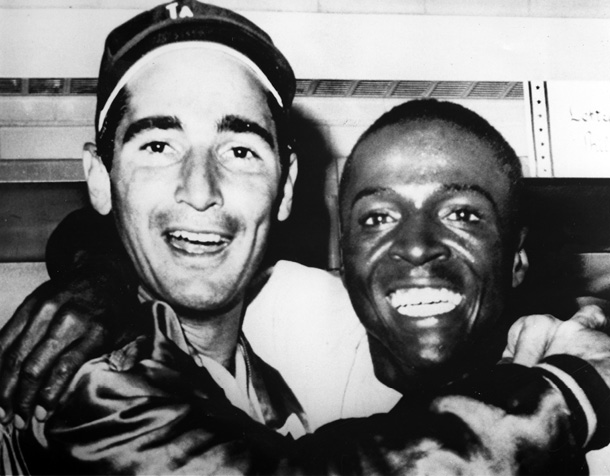A catharsis of a different kind. Two years after their fulfilling, resounding sweep of the Yankees, the once-snakebitten Dodgers won another World Series—the team’s third in Los Angeles and fourth since 1955. But 1965’s triumph came at the end of an exhausting season of scratching and clawing and self-medicating that elicited as much relief as elation.
It was a year most remembered for two grit-your-teeth moments: Giants pitcher Juan Marichal using Dodgers catcher Johnny Roseboro’s head for batting practice, and Sandy Koufax’s perfect game that the Dodgers offense backed with a single hit. It was a year that the only Dodger to bat .300 or slug .400 was pitcher Don Drysdale, who was 39-for-130 with seven homers.
Down 41/2 games to the Giants on September 15, the Dodgers found the way to win 13 straight and 15 of their final 16, allowing only 17 runs over that stretch. On October 1, Koufax struck out 13 in clinching the title for the Dodgers with a 3–1 victory over the Milwaukee Braves. How did the Dodger offense break a 1–1 tie in the fifth? Almost inexplicable bases-loaded walks to Roseboro and Koufax.
There was every indication that the Dodgers were spent by the time the World Series began in Minnesota on October 6: Yom Kippur that year. Famously, Drysdale got the Game 1 start instead of Koufax, and when Walter Alston met Roseboro and Drysdale at the pitcher’s mound to pull him during a six-run third inning, the pitcher supposedly quipped, “I bet you wish I was Jewish, too.” (Rob Neyer, in his Big Book of Baseball Legends, investigated the story and found that “all three of these men later composed their memoirs [Alston twice], and yet none of them happened to mention this seemingly memorable joke that Drysdale made.… A check of various newspaper archives doesn’t find it attributed to Drysdale until the 1980s, usually in reference to Sandy Koufax and the status of the Jewish ballplayer.”) No matter—the tale spoke volumes, with the added irony that on Game 2 the following afternoon, Alston probably wished Yom Kippur had returned in time to prevent Koufax from allowing two runs in the sixth inning of a scoreless contest. The Dodgers lost the game 5–1 and headed back to Los Angeles in a 2–0 Series hole.

Sandy Koufax and Lou Johnson were Game 7 heroes of the 1965 World Series. The Dodgers defeated the Minnesota Twins 2–0. Koufax pitched a complete-game shutout and Johnson drove in the initial run with a home run. Photo courtesy of Los Angeles Dodgers, Inc. All rights reserved.
In Game 3, the Dodgers’ one major preseason acquisition paid its greatest dividend. Claude Osteen, acquired in a deal that marked the departure of slugger Frank Howard, threw a 4–0 shutout backed by RBI hits from Roseboro, Lou Johnson, and Maury Wills that put the Dodgers back in Series contention. A three-run sixth gave Drysdale breathing room in a 7–2 Game 4 victory, and then Wills’ four hits helped Koufax cruise to a 7–0 Game 5 shutout, in which he took a perfect game into the fifth inning and a two-hitter into the ninth.
But nothing was going to be entirely easy for the Dodgers, not this year. Back in Mnnesota, Mudcat Grant hit a three-run homer while pitching a complete-game 5–1 victory on two days’ rest, setting up the Dodgers’ first Game 7 since ’55.
Koufax and Jim Kaat, also pitching on two days’ rest, started out scoreless through three innings. Then, leading off the top of the fourth, “Sweet” Lou hooked one off the left-field foul pole to put the Dodgers on the scoreboard and give Koufax the only run anyone ever hoped he would need. Wes Parker’s high chopper over first base to drive in Ron Fairly that same inning seemed almost luxurious in context.
Koufax, who later said he relied on fastballs because his curveball had abandoned him, would get even more help. In the bottom of the fifth, with runners on first and second and one out, Jim Gilliam—who began the season as a Dodgers coach—made a sprawling, backhanded stop of Zoilo Versailles’ grounder for a force play that helped preserve Koufax’s shutout.
In the ninth, a one-out single by Harmon Killebrew gave the Twins two final chances to tie the score. But Koufax fanned Earl Battey and Bob Allison to end it. A very much non-leaping Koufax, who had struck out 29 in 24 innings over nine days while allowing one earned run, joined the Dodgers in thankful celebration. In the clubhouse after the game, Vin Scully reminded Koufax that after that Game 5, Koufax said he felt 100 years old. “So today,” Scully asked him, “how do you feel?”
“A hundred and one,” Koufax replied. “I feel great, Vinny, and I know that I don’t have to go out there any more for about four months.”
Zero for ’66
Dodgers futility never got a more public airing than the 1966 World Series against the Baltimore Orioles. In Game 1, Jim Lefebvre homered in the bottom of the second inning, and Jim Gilliam walked with the bases loaded in the third. That was it—the team was done. For the remaining 33 innings, the Dodgers did not score. Only two Dodger base runners reached third base. The nadir was Game 2, when the Dodgers made six errors, three in the space of two batters by center fielder Willie Davis, though back-to-back 1–0 losses in Games 3 and 4 offered their own special brand of excruciation. The Dodger doldrums began in earnest in 1967, after Sandy Koufax retired, but the entry point was here.